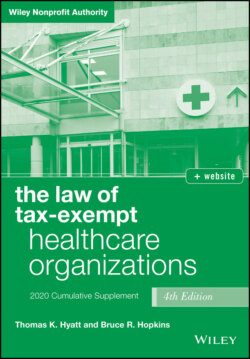Читать книгу The Law of Tax-Exempt Healthcare Organizations - Bruce R. Hopkins - Страница 27
На сайте Литреса книга снята с продажи.
*§ 13.6 CANNABIS‐RELATED SERVICES ORGANIZATIONS
ОглавлениеThere has been rapid growth in the development of medicinal cannabis products and services, catalyzed by the substantial increase in legalization of such use (including in many cases for recreational use) at the state level. As of late 2019, thirty‐three states and the District of Columbia had passed laws broadly legalizing marijuana in some form.121 In 2018, investors put $10 billion into the North American marijuana market, expected to grow to $16 billion by the end of 2019.
Notwithstanding this sea change in regulation of cannabis use at the state level, current federal law prohibits the use of cannabis except in limited circumstances, which do not include the medicinal use of cannabis. Federal law does not currently recognize any health benefits of cannabis and classifies it as a controlled substance.122
This conflict in legislative and regulatory approaches has come to a head in the case of nonprofit organizations, doing business in states in which medicinal cannabis use has been approved, seeking recognition of federal tax‐exempt status as charitable organizations. In two instances, the IRS has determined that organizations involved in various aspects of providing cannabis‐related services do not qualify for tax exemption as charitable organizations because they have illegal purposes that violate federal law.
In one case, an organization described its purposes and goals as aiding financially disadvantaged patients and their families affected by the costs of THC and CBD123 medical treatment by providing financial support to cover their cost of living and other expenses; to educate healthcare providers in the general public about THC and CBD medical treatments; and to support and engage in research of THC and CBD medical treatments.124 The organization planned to provide funds to patients who demonstrated financial need to help them offset the costs of these medications. All patients eligible for such financial assistance must be certified as meeting applicable state requirements to legally obtain CBD‐ and THC‐based medications for medical reasons. Financial assistance would not include reimbursement for medical marijuana medicines. The organization would also engage in educational initiatives such as developing CBD and THC educational literature to help patients; conducting seminars and classes for healthcare professionals; organizing support groups; and accumulating and publishing empirical data reports related to CBD and THC medications and treatments.
The IRS determined that the entity was not organized and operated exclusively for charitable purposes under the Code. To satisfy the organizational test, an organization must limit its purposes to those set forth in the Code for charitable organizations, and they must not expressly empower the organization to substantially engage in activities that are not in furtherance of those purposes. In applying the law, the IRS stated that the common law of trusts specifies that a charitable trust cannot be created for an illegal purpose and that like a trust, a charitable organization cannot be created for a purpose that is illegal.125 Accordingly, because federal law prohibits the use of cannabis under these circumstances, the IRS determined that the organization does not satisfy the organizational test in that its purposes are illegal and contrary to public policy.
The IRS also concluded that the organization did not satisfy the operational test. Even though the organization was not directly providing THC‐ and CBD‐based medication to individuals and was not providing funding to directly pay for these substances, its payments were indirectly subsidizing cannabis users. In the IRS's view, this illustrates that the organization has a substantial nonexempt purpose in that its activities are enabling individuals to engage in an activity illegal under federal law. Moreover, the fact that the organization's state legalized distribution of cannabis under limited circumstances is not determinative because under federal law, distribution of cannabis is illegal. Because the organization advocated and engaged in activities that contravene federal law, the IRS determined that it served a substantial nonexempt purpose.
In another case, an organization planned to raise funds to donate to a dispensary charity care fund to assist individuals with demonstrated financial need to offset the cost associated with medical marijuana, including transportation expenses for travel to a local dispensary.126 Individuals are required to apply for the assistance and to meet with the dispensary advocate. Once approved, recipients receive financial assistance to purchase from the dispensary one month's supply of medicinal marijuana per calendar year. No funds would be given directly to the recipients. The organization also planned to host educational events such as workshops and seminars, and to conduct community outreach and advocacy activities on a daily basis. Its events are free of charge and open to patients using medical marijuana and to the general public.
As in the prior case, the IRS determined that the organization did not qualify for tax exemption as a charitable organization. The IRS found that the organization did not satisfy the operational test because it was providing financial assistance to patients using medical marijuana even though federal law does not recognize the health benefits of marijuana and classifies it as a controlled substance. The fact that the organization's state legalized distribution of marijuana and cannabis to a limited extent was not determinative for the IRS because under federal law distribution of marijuana is illegal. As a result, because the organization advocates and engages in activities that contravene federal law, the IRS concluded that it serves a substantial nonexempt purpose.127
